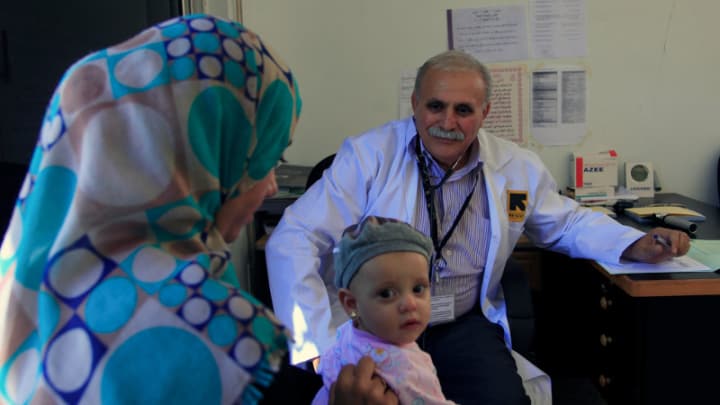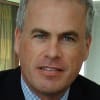
Tuberculosis thrives on war and suffering. People with compromised immune systems due to malnutrition or stress, without access to adequate medical services, and living in poor and crowded housing conditions are more vulnerable to contagion and to developing the disease.
The great majority of Syrian people, including the internally displaced people and the refugees in neighboring countries, live in conditions that are ripe for the spread of TB. Inside Syria, two-thirds of public hospitals have been destroyed or severely damaged. Areas such as Aleppo and Homs are particularly difficult to access for medical treatment and care. Even governorates that are considered safe still have pockets of insecurity, making the work difficult everywhere.
Yet, some progress has been made controlling the spread of TB in Syria and treating those who have the condition. According to WHO’s Global Tuberculosis Report 2015, some 3,479 people were placed on treatment in 2015, compared with 1,335 in 2013, a 150 percent increase. Diagnostic services have also been maintained, with 55 laboratories in 9 of the 14 governorates rehabilitated and technicians trained to use them.
Monitoring TB in Syria
UNDP has been working on tackling TB in Syria since 2007 with financial support from the Global Fund. The onset of war in 2011 has made this task highly complex. We use a range of approaches to reach patients and monitor progress across the entire country, including opposition-held and contested areas, such as Aleppo, Dara’a, Hasakeh and Homs.
A key partner in these efforts is the Syrian Arab Red Crescent Society, which has good reach, including in the most war-torn areas of the country. We also draw on the World Health Organization’s network of health professionals across Syria. Local health specialists are still working in the remains of existing health facilities, and they are committed to serve patients despite the risks involved.
In addition, former health workers who have lost their jobs due to health facilities closing down have been mobilized and are an essential part of the team. They are able to travel in and out of opposition controlled areas and to reach functioning health centers. They manage to deliver drugs to patients. These health workers transmit information on patients’ records and medications stock levels to the country’s central TB surveillance system, which is still functioning.
For monitoring in the hardest-to-reach areas, reliable data can be verified by triangulating information from the various groups working together, including SARC, WHO, local health workers and UNDP. We use active tracing to follow patients on treatment, including by reaching out to their families and friends and searching for missing patients in internally displaced settlements. In cases in which access is simply too difficult and bringing the services closer to the patient it not possible, patients travel to other health centers to receive medication and services, and their travel costs are subsidized.
4 lessons learned
These experiences in Syria have highlighted four vital lessons that could help inform efforts to combat TB in other conflict zones:
Courage and innovative thinking on the frontlines
Syrian health workers and volunteers across the country are making bold efforts to keep tuberculosis services going, despite a crumbling health system and the exceptional threats to their security. Their stories reflect heroism in a country that has lost 730 health workers since the start of the crisis, making Syria the world’s most dangerous place in the world for medical care.
These local health workers navigate checkpoints and cross battle lines into warzones to carry medication for patients and samples for testing. They work doggedly, bravely and ingeniously so that services reach all areas of the country, even those controlled by ISIS. They use mobile applications such as WhatsApp, to reach patients, coordinate the supply of medicines, monitor stock levels, and transmit lab results. They use couriers and local organizations and hitch rides with humanitarian convoys.
Strengthen and support existing local systems
International support must work through and with the remaining local health services to help them continue functioning. It is critical to maintain the capacities of institutions that deliver social service during crisis and not to dismantle or bypass them.
It may seem easier to set up parallel humanitarian arrangements, but such fixes work to the detriment of longer-term viability and sustainability of the health care system. Peace will eventually return to Syria. The health system will be rebuilt and will recover over time. Continued support for local health services and workers during this protracted conflict is the most forward-looking approach to fighting TB in crisis settings such as Syria.
Reach everyone you can
International support must reach all people in Syria, not just the internally displaced, or the refugees who have fled the country. Equally important are the people who have remained throughout the war and whose access to health services is just as compromised.
Virtually all internally displaced people live in host communities and informal settlements, not in organized refugee camps. Focusing only on IDPs and not the local population doesn’t make sense from a public health point of view. These two populations live together in close quarters, share the heightened risk of tuberculosis and have the same rights to prevention and treatment services.
Vigilance in spotting multi-drug resistant TB
Curing tuberculosis requires nine months of daily medication and close medical supervision. Patients displaced by the war may lose access to services and interrupt their treatments, thereby significantly increasing the risk of developing multi-drug resistant strains. So far, the number of patients “lost” to treatment in Syria has been limited, but as the crisis grinds on, this risk is growing.
These lessons from Syria are important for the global response to TB. We must keep the momentum going. Progress made in the midst of war is fragile and must be nurtured. The courageous people of Syria need continued support and resources to do their jobs.
Join the Devex community and access more in-depth analysis, breaking news and business advice — and a host of other services — on international development, humanitarian aid and global health.




